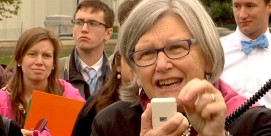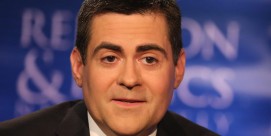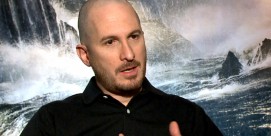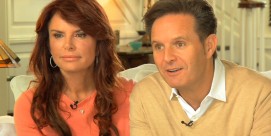Chaplain Barry Black Extended Interview
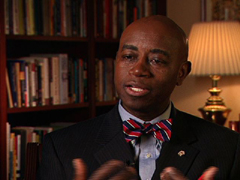 Read more of Kim Lawton’s interview with U.S. Senate chaplain Barry Black:
Read more of Kim Lawton’s interview with U.S. Senate chaplain Barry Black:
Q: Let’s start with your work as the Senate chaplain. What’s a typical day like for you? What are your main spiritual responsibilities?
A: I’m the pastor for about 7,000 people on the Senate side of Capitol Hill, so I don’t simply provide ministry for the senators and their family members, but also for staffers and the many other people who work on Capitol Hill — janitors, waitresses, Capitol police officers. As their pastor I am interested in their spiritual well-being, so I have five Bible studies a week. One is for senators only. One is for the spouses of senators. And then there are two plenary Bible studies where anyone who desires to come may do so. And I have a Bible study for the chiefs of staff. I also have a spiritual mentoring class, a ten-week program where I take ten people and help them to learn how to practice the spiritual disciplines more effectively. I officiate at weddings and funerals. I conduct seasonal observances. I do pastoral counseling. I have an advisory function to senators and their staffs regarding the ethical dimensions of the various issues that are debated in the chamber. So, in short, I am a pastor for about 7,000 people.
Q: And you do the daily prayers as well?
A: I do a prayer to open each session of the Senate.
Q: What goes into those prayers as you craft them? What are you trying to do with each of them?
A: I see myself as an intercessor. I see myself as articulating the longings and the concerns of the people whom I seek to minister to. And so I, in my pastoral contact, I get a feel for what the concerns and the challenges are, and I try to incorporate those concerns and challenges into my prayer. I have a marvelous opportunity to frame the day for the senators, and it’s a wonderful privilege to offer that invocation at the opening of each Senate session.
Q: When you do the counseling sessions and deal with some of the ethical and moral dilemmas that the senators face, I think a lot of people wonder, do they come to you for policy advice when they’re facing a tough vote? How do you handle that?
A: Although my position is nonpartisan and nonsectarian, I am not expected to be neutral. There are senators who are interested in what is your opinion on this particular issue. Many of them know about my academic background — a doctorate in theology and a doctorate in psychology. And so there are issues, biomedical ethical issues and issues of justice that they are interested [in]: “Chaplain, what is your spin on this particular issue?” So I can tell them what I think, and of course they can use it however they desire.
Q: Do you ever get lobbied or pressured from people who say that if you have the senator’s ear, maybe you can try to sway him or her in a direction?
A: I have learned that everyone who comes to my office does not have pristine motives. That’s the succinct response. There are those who will begin in a very affable and neutral way. But eventually the bottom line will emerge, and of course I know what to do with that. I simply remind them that I am nonpartisan and nonsectarian.
Q: You speak about being nonsectarian. I know this is also something military chaplains, which is your background, deal with. How do you handle that? You come from a very particular background. You have your own deeply held beliefs. How do you maintain those beliefs, stay true to what you believe, but also respect another person’s beliefs, especially if that person may believe something very different?
A: I think from a Christian perspective — most Christians have more in common than they have differences. From my religious tradition, for instance, I can say a fervent amen to the Apostle’s Creed, and most people here on Capitol Hill who are Christian can do the same. So it is very easy for me to minister to Protestants and Catholics, and Protestants and Catholics come to my Bible study. When I am providing a ministry to Jewish people, to people from the Islamic tradition, to Hindus and Buddhists, I obviously have limitations, and so we have Torah studies here on Capitol Hill where I bring in a rabbi who teaches the Torah. I bring in an imam when there are high holy days for people from the Muslim tradition. It is an opportunity to cooperate without compromising. It’s really a lot easier than most people would imagine. When you look at what Christians have in common across the spectrum of religious traditions, you know — believing God the Father Almighty, maker of heaven and earth, Jesus Christ his son who was conceived by the Holy Ghost, born of the Virgin Mary, suffered under Pontius Pilate, crucified, dead and was buried, descended into hell — you know, any of the creeds — most of the Christians on Capitol Hill can say an amen, so it’s really not that difficult.
Q: Seventh Day Adventists in particular stress spreading the gospel, bringing people to faith. Is there a temptation to do that?
A: I believe it was Francis of Assisi who once said, “Preach the gospel. When necessary, use words.” I have to know the difference between providing support to people and proselytizing. Having been a military chaplain in a pluralistic setting, a religious diversity, for 27 years, I am very, very comfortable with an environment where I am encouraged to support but not to proselytize.
Q: Was it a challenge for you as a member of the Seventh Day Adventist (SDA) tradition in the military chaplain program? You write there weren’t a lot of SDA chaplains when you started in the program. Were there aspects that made that challenging? A lot of people are not familiar with your faith tradition.
A: Seventh Day Adventists believe in the deity of Christ. Seventh Day Adventists believe in salvation by faith, salvation by grace through faith — Ephesians chapter 2. Seventh Day Adventists believe in the inerrancy of Scripture. Seventh Day Adventists believe in the second coming of Christ, the soon return of Christ. So if you go down the list of major doctrines, the Holy Spirit and on and on it goes, Seventh Day Adventists believe that. So it really was not that much of a challenge. I conducted thousands of Bible studies during my 27 years as a Navy chaplain, and I always had a wonderful attendance. I conduct Bible studies here. We can get as many as 200 at some of our plenary Bible studies, and people are very, very comfortable with the presentations I make, because it is critically important, I believe, to find the common ground, and there are tremendous opportunities to do that. I think there was some curiosity on the part of people, because as you probably know a significant number of Senate chaplains have been Episcopalian. In fact, the first eight or nine were Episcopalians. A significant number have been Presbyterian. Four of my last five predecessors were Presbyterian. But, again, I think we’re at a point where people are willing to say let’s hear this individual and see what he or she has to say. And most of them seem to be quite pleased with what they’re hearing because, quite frankly, many people are not that familiar with Seventh Day Adventists, and they will sometimes mistake the doctrines of the Seventh Day Adventist church for the doctrines of some other religious traditions. So it’s an excellent opportunity for me to, many times, demythologize their perceptions regarding the Seventh Day Adventist faith.
Q: What is distinctive and particularly meaningful? What has kept you in that tradition your whole life?
A: I am very appreciative for the emphasis of the Seventh Day Adventist church on Christian education. We have one of the strongest Christian education programs, I think, in the world. And so although I grew up in the inner city of Baltimore in a public housing project, my seven siblings and I matriculated at Christian schools from grade one through graduate school. I believe it provided a cocoon that enabled us to develop our wings. That is just one of the things that I celebrate about the Seventh Day Adventist church. There’s also, as you probably know, a tremendous emphasis on health. There have been studies that revealed Seventh Day Adventists, because of their emphasis on health, live longer. I have made the observation that one commentator said “if you can call that really living.” For instance, I’m a vegetarian. I grew up that way. Now although all Seventh Day Adventists are not vegetarian, there is an emphasis on a healthy lifestyle — fresh air, pure water, exercise, and not a lot of red meats and that kind of thing. In fact, we abide by the dietary law of the Old Testament — Leviticus chapter 11 and Deuteronomy chapter 14. So there are foods on the hit list. But, you know, I’ve been a vegetarian, so that’s not been a problem. But I appreciate the emphasis on health in the Seventh Day Adventist church.
Q: Talk a little more about the importance of the church in your background, especially given the tough circumstances of your neighborhood.
A: I grew up in a church that became for me an extended family of tremendous support. My mother was on public assistance. She could not afford the tuition for Christian schools. And yet the church that I grew up in, Berea Temple Seventh Day Adventist Church in Baltimore, Maryland, had a program where the church would supplement financially the tuition needs of students so that any child, regardless of socioeconomic level, would receive a Christian education. I just think that was tremendously critical. Also, because my father was not around a great deal, to have wonderful, positive male role models in the church was a tremendous blessing and made a critical difference in my development and in the development of my siblings and so many others who were able to take advantage of that opportunity.
Q: You’ve said your mother had a real impact on you. Talk about the role she played spiritually for you.
A: My mother was baptized when she was pregnant with me. I have three older siblings, and as she entered the — we say “the watery grave of baptism” (Seventh Day Adventists immerse), she prayed for a special anointing on her unborn child. I don’t remember ever not wanting to be a minister, a preacher. It was just as if there was a call on my life from birth, and my mother, of course, reminded me that I had been set apart by God. My mother gave my siblings and me our allowance based upon memorizing Scripture — a nickel a verse. She eventually put me on a flat rate because it was breaking the family budget. But that was a tremendous inspiration. And her wonderful modeling of spirituality, her commitment to her faith — I think that that made a tremendous difference, a positive difference in my life and in the lives of my siblings. Someone said, “What you do speaks so loudly people can’t hear what you say.” My mother backed her rhetoric with substantive action.
Q: How much of the Bible have you memorized?
A: Quite a bit. I’m memorized quite a bit. Those nickels — you know, with monetary motivation, obviously — and I love the Bible. I believe that it is a success manual. Growing up in the inner city I fell in love with the Book of Proverbs because the verses are short, so the nickels came more quickly. We call that picking the low-hanging fruit. And so this was an amazing success manual for me. I remember reading Proverbs 3:5-6: “Trust in the Lord with all your heart. Lean not upon your own understanding. In all your ways acknowledge him, and he will direct your path.” And that, to me, was like an epiphany. It was just this amazing blueprint for ensuring that there would be a loving providence behind the unfolding of your life. So simple verses like that made a tremendous impact upon my thinking, and they had a tremendous impact upon how I lived my life.
Q: You are the first African-American Senate chaplain. What challenges do you face?
A: I believe that God equips people for the doors he opens. I guess I may be a bit different, but I didn’t think a whole lot about race, you know, except for the human race, and though I was a pioneer in a lot of areas — I would sometimes be in a room of 50 people and I would be the only African American — I never sat there thinking, you are the only African American in this room. Or when someone would say to me, you know, “Barry, what do African Americans think about this?” it always startled me that people expected me to speak for an entire race. Just didn’t seem logical. So I think one of the reasons why I was placed in positions where you could call me a pioneer was because people sensed that racial labels were not really a big part of my perception of the world or my perspective on the world, and that I believed in a meritocracy and that individuals who were qualified — they are the ones who should be given the opportunity to play on that level playing field. I think one of the reasons why I ended up with three master’s degrees and two doctorates was because I was determined to create a resume that would transcend race. I wanted an individual on a promotion board who may have even been socialized to think of me as inferior to look at my paper and basically say, “We’ve got a problem if we’re going to stop this guy.” So I was more interested in doing my best. Martin King once said, “If it falls your lot to be a street sweeper, go out and sweep streets like Michelangelo carved marble, like Raphael painted pictures, like Beethoven composed music, and like Shakespeare wrote poetry. Sweep streets,” he said, “so well that all the host of heaven and earth will have to pause and say, ‘Here lived a great street sweeper who swept his or her job well.'” My focus and my determination [were] to be the best that I could be. I competed against myself and to maximize the potential of the God-given talents that I was given, and that focus transcends race, and I think people pick up on it.
Q: I know that Martin Luther King Jr. was one of your role models for being a good preacher. What do you think makes a good sermon? What makes someone a good preacher?
A: I have a chapter in my autobiography, From the Hood to the Hill, where I talk about learning to preach. I think a passion for Scripture — it’s critically important because I think sermons that are not rooted in God’s word are nice speeches, but the power of the sermon comes from the scriptural content. I think that a minister must study himself or herself full — that there should be as much light as heat, okay? A lot of people are very passionate, and you’ve got the heat but not the light. Then he or she should think himself or herself clear. You need to know what you want to say, and that gives you an element of being free from notes. I think there should be a liberty in freedom. If standup comics, if defense attorneys can discipline themselves to go without a lot of paper, then I think those who are blessed with the opportunity to present treasures, divine treasures, should discipline themselves to think so clearly that you know what you’re going to say, and you’re not tied to notes. One old lady heard a young preacher, and he was reading, and at the end of it she said, “Son, you made some mistakes.” She said, “Number one, you read it.” She said, “Number two, it wasn’t worth reading. And number three, you read it poorly.” She said, “If you can’t remember it, how do you expect us to remember it?” So think yourself clear, and then pray yourself hot. I think that there should be a spiritual dimension — that a minister should never enter the pulpit without a sense of dependence upon a divine power. And then let yourself go. There should be a freedom. You shouldn’t be inhibited. Those are four of the Chaplain Barry Black commandments for presenting an effective sermon.
Q: What’s the toughest part of the job you do now, the biggest challenge?
A: The biggest challenge in this job is to make sure that I maintain my moral authority. Aristotle in his Rhetoric said that there are three aspects of persuasion. There’s a tripod for persuasion, and he used three Greek words: ethos, pathos, and logos. Logos has to do with the ability to present reasoned arguments. Pathos has to do with the ability to engender emotions. But ethos is when people perceive you to be ethically congruent, when they perceive that your rhetoric is backed by your actions. We see a great televangelist and spiritual leaders who have a moral lapse, and their power is gone. Once you lose ethos, once people no longer perceive that you are the real deal, your power is gone. So keeping Chaplain Barry Black in the straight and narrow, ensuring that I don’t deviate from the path of unswerving integrity — that is my greatest challenge.
Q: How tempting is it to be surrounded by the power that’s here in the U.S. Capitol? You’ve got one of the best views in this city in your office. Every day the most powerful people in the world come to you.
A: This can be a very seductive environment, and yet I think that if you keep your devotion in life strong and — the first thing each day involves greeting the sovereign God of the universe and having an interaction with him. There is something about being in the presence of God that enables you to keep the baubles of mere time in the proper perspective. I often think of Daniel, who’s one of my heroes. Daniel had an amazing governmental career that spanned the decades. He was an advisor to Nebuchadnezzar. He later became an advisor to Belshazzar, the grandson of Nebuchadnezzar, and then to Darius when Babylon fell and the Persian empire arose. I often say that I doubt if Daniel had paintings of himself shaking hands with Nebuchadnezzar in his office. Once I was asked, “Admiral, you have two stars, but you advise four-star admirals. Is that intimidating?” And my answer was, “It is difficult to become intimidated by someone wearing four stars when before you encountered that person on a particular day you commune with the one who made the stars.”
Q: Talk about that communion with God. You’re so busy giving to other people and trying to keep their spiritual life warm. How do you keep your own spiritual life on fire?
A: David said in the 119th Psalm — and I got a nickel for this when I grew up — “Your word I have hidden in my heart that I may not sin against you.” And so repeated exposure to sacred scriptures — I think that that’s a critical factor. I drive a 40-minute drive in order that I can listen to the scripture on CD. You can listen to the entire Bible in less than 80 hours. I’m listening to James Earl Jones read the Bible right now, which is a wonderful experience in itself. I sometimes think I’m listening to Star Wars, but, you know, that’s another matter. And so by that repeated exposure to sacred scripture — learning to worship when you’re not in church, praise music, learning how to pray and pray effectively, learning how to practice the spiritual disciplines, what I teach in my spiritual mentoring class, unleashing the power of fasting, journaling, learning how to meditate — those are some of the critical disciplines that you can use to maintain spiritual fitness. I call them spiritual calisthenics.
Q: In your book you called prayer the breath of your soul. What does that meant for you, and how does it work for you?
A: Prayer to me is conversation with God. 1 Thessalonians 5 says “pray without ceasing.” So the prayer should be like breathing. You inhale and you exhale. It’s an amazing privilege to talk to God whenever you desire. If I wanted to see the Majority Leader it would take me a couple of hours to get on his schedule. If I wanted to see the President of the United States, it’d probably take me a couple of months to be able to get into the White House. And yet I have the awesome opportunity to enter the throne room of the sovereign God of the universe, the one who created the Majority Leader and the President, and to have a conversation with him whenever I desire, and so learning that ebb and flow of prayer, of talking to God. Now one of the things that I like to do is to pray the scriptures, because I believe prayer is a dialogue, and so very often I will pray before an open Bible. I believe that when you pray before an open Bible you give God the courtesy of starting the conversation. And so I will open the Bible and I will read until something stops me, something impresses me, something warms my heart. And then I’ll talk to God about it. And then I’ll continue reading until, you know — and so it becomes an ebb and flow. It is one of the most beatific spiritual experiences you can have.
Q: You have had the opportunity to be part of some of big events in our national life — for example, when Rosa Parks lay in state in the Capitol. What were your thoughts then?
A: I feel extremely humbled because there are many, many others who are just as qualified who could have this opportunity. In this job and in my previous job as chief of chaplains for the United States Navy, you have an opportunity of having a front row seat to history. For the Rosa Parks ceremony, I was the first person that the coffin went by in the rotunda, and of course I offered a prayer for that. For the Ronald Reagan funeral, the same thing. For the Gerald Ford funeral, the same thing. With the eyes of the nation riveted on this state funeral, I had a front row seat to history. A couple of weeks ago we gave a Congressional Gold Medal to the Tuskegee Airmen. I had the wonderful privilege of offering the prayer for that event, of officiating at the re-internment of the bones of Matthew Henson, the African American who was a co-discoverer of the North Pole. Providing ministry to the Kennedy family by officiating at the burial at sea for John F. Kennedy Jr., of offering a prayer at the USS Cole memorial ceremony. At the 9/11 ceremonies of being able to read a scripture, offer a prayer. You literally have the wonderful privilege of having a front row seat to history and of being a participant in history and providing ministry many times to a hurting nation or hurting families. So I thank God for this great opportunity.
Q: John Kennedy’s burial at sea must have been a very emotional time for the family and for you.
A: I remember when John Kennedy was assassinated. I remember Camelot. I remember Jackie. I remember seeing John-John playing under the chair in the Oval Office, and Caroline. I remember the salute. I was watching television when Oswald was shot. I know what this family has gone through. And so it was with some sense of reverential awe that I provided a ministry for a great family during a very painful time in their lives and a painful time in the life of the nation and experienced the grief with them because this was, I think, a time of national mourning. What an awesome opportunity. Instead of having to sit back and have nothing to do with it except to be a spectator, what an awesome opportunity to be a participant.
Q: As a chaplain, you understand these people that we may look at as icons or political figures, but you really see them as human beings, don’t you?
A: They come to my Bible study on a weekly basis. We have a weekly prayer breakfast here at the Senate. We just had one this morning that they come to. I interact with them on the floor when they have the roll call votes. They drop by my office. I drop by their offices. So you get to know them as real people, and it is a marvelous opportunity to provide pastoral support.

